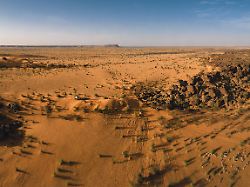Green energy from Africa
Large-scale plant in Mauritania to supply hydrogen
03/08/2023, 7:38 p.m
Green hydrogen is supposed to make Germany climate-neutral – but it is scarce. There is now a new major project in West Africa that is intended to help change this. A huge electrolysis plant is being built in Mauritania with German participation.
A large-scale plant for the climate-neutral production of hydrogen is to be built in Mauritania, north-west Africa. The electrolysis capacity could reach up to 10 gigawatts in the final stage, as the project developer Conjuncta announced in Hamburg. Green hydrogen, ammonia and renewable fuels could be produced for export, a total of up to eight million tons per year. The electricity is to be generated in the hinterland by wind turbines and photovoltaic systems.
A corresponding declaration of intent was signed last week by the Mauritanian oil minister, the joint venture Infinity Power and Conjuncta. Infinity Power is backed by the Egyptian green electricity producer Infinity and the state-owned renewable energy company Masdar from the Gulf Emirate of Abu Dhabi. To put this in context: According to the coalition agreement, the electrolysis capacity in Germany is also to be expanded to 10 gigawatts by 2030.
In the first stage, the plant in Mauritania is to achieve an electrolysis capacity of 400 megawatts. The first hydrogen is to be exported via a port in 2028. The focus of Conjuncta’s activities is on the commercial part of the project development, said Managing Director Stefan Liebing. According to Mauritania’s Oil Minister Abdessalam Mohamed Saleh, the project will make it possible to enter the European market for green hydrogen, primarily in Germany. According to Liebing, Mauritania has already agreed three similar projects with investors.
Hydrogen plays a crucial role in the energy transition. He is able to replace coal and gas in industrial processes. A CO2-neutral economy is possible with hydrogen. Africa has everything that is fundamentally necessary for this: large areas of undeveloped land, sun, wind and hydropower. In May 2022, six countries – Egypt, Kenya, Mauritania, Morocco, Namibia and South Africa – founded a United Nations-backed alliance that aims to jointly produce 500 kilotons of green electricity annually. As part of its national hydrogen strategy, Germany has entered into partnerships with Namibia, the Democratic Republic of the Congo, South Africa, Angola and Morocco.
